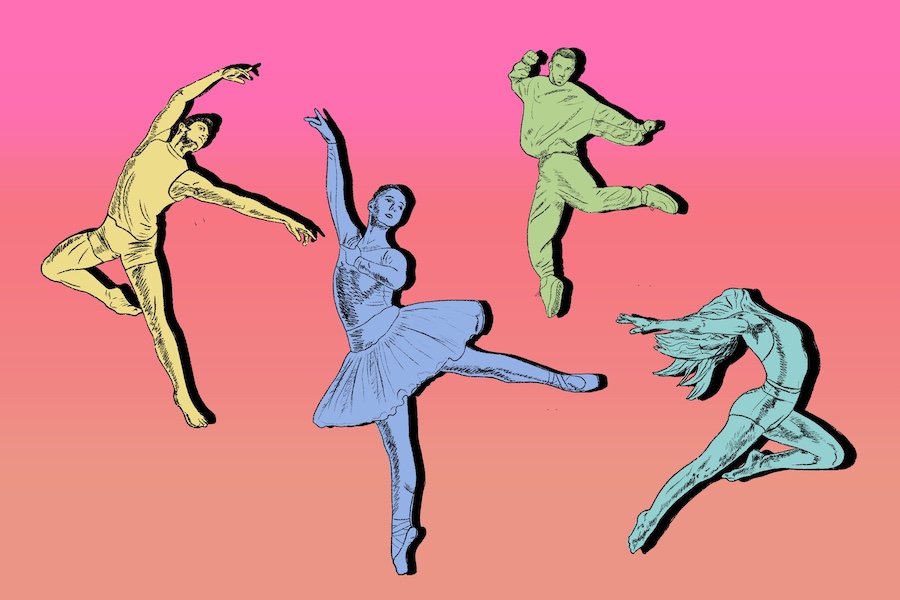Members of Dancers Amplified, network of dancers striving for inclusivity, discuss equality in the industry
Illustration by Carly Schulman
Dancers Amplified is a network of dancers across the country striving for inclusivity and acceptance in the dance industry.
April 12, 2021
For Evanston dancer Kara Roseborough, making the dance industry more inclusive and accepting has always been a top priority.
Because dance is “deeply rooted in European elitism,” Roseborough said she and other non-White dancers face countless challenges.
“I may be existing in White spaces, but I can join other people with similar experiences and rally for change,” she said. “That feels powerful… it makes me believe we can see change in our lifetimes.”
Roseborough is a core member of an alliance called Dancers Amplified, a network of dancers across the country seeking racial, cultural and gender justice in the dance industry. The organization formed shortly after the death of George Floyd and initially focused on creating a safe space for Black dancers. Now, the group has expanded its mission to strive for inclusivity for all marginalized communities.
The organization is broken up into multiple committees and provides resources to dance companies, like lists of diversity, equity and inclusion consultants and dictionaries of inclusive language.
Roseborough said the members meet over Zoom to discuss action items that will help them make tangible changes. Although some dance companies have begun to reevaluate their approaches, she said many pledge to “do better” but fail to follow through.
“What does it mean to be gender inclusive? To dismantle the gender binary system of ballet?” Roseborough asked. “What does it mean to share these stories and the intersectionality between that and the stories from the Black diaspora and Latinx diaspora?”
Roseborough said it’s important to her to maintain the original goal of the grassroots organization, which is battling racial injustice for the Black community and teaching companies to be actively antiracist.
Alexa Capareda, another core member of Dancers Amplified, echoed Roseborough’s statements and highlighted the sense of community and connection she feels from talking with other dancers who hold marginalized identities.
“It’s about understanding each environment because there’s not a one-size-fits-all solution for equity in the workplace, but there is a way to share knowledge and see what are the ways we can take care of each other and listen more,” Capareda said.
Similarly, dancer and member Alyah Baker said she’s been able to relate with some of the other dancers in Dancers Amplified and feels reassured that she’s not the only one who has experienced discrimination in the industry.
Everyone comes to the organization with unique backgrounds, which leads to robust and informative conversations, Baker said.
“Part of oppression is making people feel like (the discrimination) is only happening to them, that they’re the problem and not the system,” Baker said. “It’s great to have other people to dialogue with and to have everyone bring their respective strengths to conversation.”
Baker said it’s important to have those discussions to understand where everyone is coming from and how best to fix the problems.
Baker’s interactions with the other dancers have taken place mostly over video calls and on Google Docs, but she said she has still felt connected to the other members.
“It’s really a place to reckon with these intersections and to figure out how we can start to dismantle some of the systems that have been harmful for many and to pose new ideas and new ways of working together that can really help to bring the art form up to speed,” Baker said.
Ultimately, Roseborough said although she was taught through ballet to be quiet and not speak up for herself, she knows she has the ability and expertise to be as loud as she wants to be on these topics.
But she also knows if she ever faces pushback, especially in the form of racism, she has a whole network of dancers who will “rally with (her) and make noise.”
“I believe in the change we’re striving for, not just in the abstract, but also in tangible items on the table,” Roseborough said. “To be in a room full of people saying we’re going to speak for ourselves now and shift the narrative — that feels really empowering.”
Email: [email protected]
Twitter: @laya_neel
Related Stories:
— NU alumna continues to shine in the Joffrey Ballet’s latest performance
— Evanston Dance Ensemble to take audiences on “space odyssey”
— Local arts collective aims to bring community together through performances












